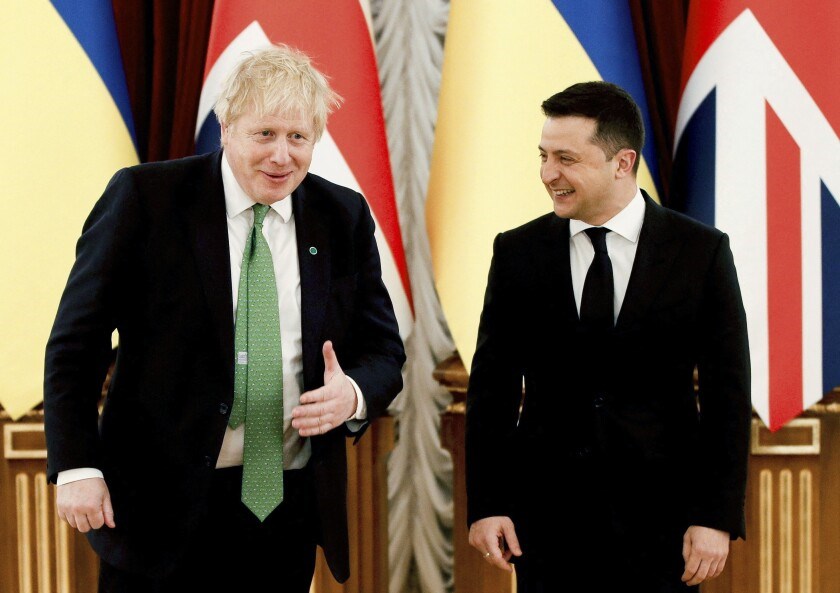UK, Ukraine call for 'complete isolation' of Russia
The United Kingdom and Ukraine see that Russia must face even harsher sanctions than those imposed on it, and call for completely isolating it.
-

British Prime Minister Boris Johnson and Ukrainian President Volodymyr Zelensky at the presidential palace in Kiev
British Prime Minister Boris Johnson and Ukrainian President Volodymyr Zelensky agreed Saturday that the world had to "isolate Russia completely diplomatically and financially," London said.
"The Prime Minister spoke to Ukrainian President Zelensky this evening. The leaders agreed on the need for the international community to isolate Russia completely diplomatically and financially," a Downing Street statement said.
The two European leaders welcomed international moves that aim to eradicate Russia from the SWIFT international banking system.
Ukrainian President Volodymyr Zelensky called on his European counterparts Saturday to exclude Russia from the SWIFT mechanism following statements from Italy and Hungary suggesting that they would not block the move if it was brought to the table.
Budapest dismissed allegations that it had blocked an attempt to sever Moscow from the system, with its foreign minister Peter Szijjarto saying such claims were "fake news".
Italy had also shown much reluctance toward excluding Russia from the mechanism, fearing that Moscow would stop delivering its gas supplies, though the Kremlin had previously said their economic ties would not be affected by the European decision-making.
Italian Prime Minister Mario Draghi had spoken to Ukraine's president on Saturday, affirming that Rome "will fully support the EU line on sanctions against Russia, including those relating to SWIFT."
According to London, Johnson praised the "incredible heroism and bravery of President Zelensky and the Ukrainian people", and both Moscow's forces were being met with greater Ukrainian resistance "than [Russia] calculated on."
Johnson and Zelensky also voiced their "mutual concern" about Belarus' role in the latest developments in Ukraine.
Russia has for months been warning of the threat posed against it by NATO's attempts to expand eastward, which happened simultaneously with an increase in NATO military activity along Russia's borders, and batches of lethal weapons being sent to Ukraine, prompting Russia to request security guarantees from the West. Washington failed to provide the guarantees.
After the West did not respond to Russia's demands, and amid Ukrainian shelling on the Donetsk and Lugansk People's Republics, President Vladimir Putin initiated a special military operation in Donbass.
Moscow's ministry of foreign affairs informed the international community the operation in Ukraine was not the beginning of a war, but rather an attempt at curbing one after the west bombarded the situation with condemnations.

 3 Min Read
3 Min Read











